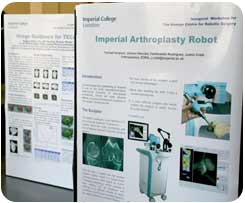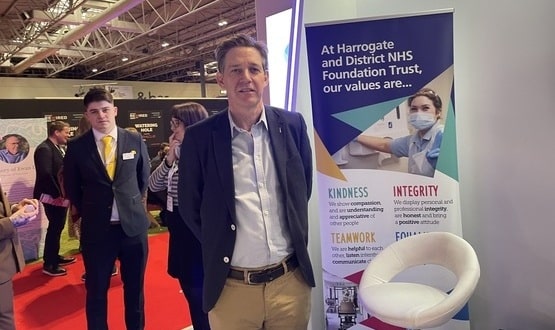Students showcase medical robotics innovations
- 8 May 2008
 |
A new type of endoscope probe which can plot a 3D course inside a patient using fibre optics, was one of five new robotic innovations showcased by students at Imperial College London on Tuesday.
Special software has been designed which can plan a course inside the body for a flexible robotic tube – the endoscope probe.
Once the software has found a route, the robot can push the probe safely through delicate tissue to deliver drugs and carry out biopsies in areas of the body, such as the brain.
System developer, David Noonan, said: “This is a unique concept where the robot simply follows the software’s map and sends a probe into the body following the 3D course it has been assigned. So long as it doesn’t break along the journey, it enables clinicians to get a good 3D view of what is happening and enables them to perform surgery in a much more informed manner.
“This will guide the surgeon in real time as he or she performs delicate minimally invasive medical procedures. Scientists believe the endoscope will improve the performance of the surgeon, ensuring safer and more accurate surgery.”
A similar proposal was also presented looking at using probes to investigate soft tissue conditions.
Developer Tassani Parittotokkaporn, said: “Soft tissue abnormalities can be very difficult to spot and treat. If we use a probe with camera abilities, then we will be able to accurately see the damage first hand, and prepare the right course of action to speed up recovery.”
The probe is one of five projects presented by postgraduate and doctorate students at the new Hamlyn Centre for Robotic Surgery.
Speaking at the centre’s inaugural workshop at the Royal Geographic Society, Professor Lord Ara Darzi, a co-director of the centre, said: “What we are witnessing today are the latest advances in robotic surgery. This is technology that can deliver medical treatments by navigating the safest path through the body and will help to make surgery more accurate, reliable and safer for patients.”
Other projects presented included a robot to help with orthopedic surgery, a research project partially funded by the Department of Health.
Developer Wa’el Dandachli, said: “ORMIS is an orthopedic robot which can aid minimally invasive surgery. There are currently over 64,000 hip fracture operations in the UK every year. ORMIS will aid clinicians with these complicated operations, ensuring accurate and precise surgery and ensuring the operation is done correct the first time round.”
Also included in the showcase included probes to help see MRI scans more quickly and the use of virtual reality eyewear to guide visually impaired people when they walk on streets.
Professor Guang Zhong Yang, co-director at the centre, said: “The benefits of medical robotics in healthcare are enormous and this workshop has provided a forum to discuss some of the latest technological advances in the field. This research is pushing forward the boundaries of medical robotic technology.”
The Hamlyn Centre for Robotic Surgery was opened in March with £10m funding from the Helen Hamlyn Trust. It aims to champion the integration of robotics into medicine and patient care, and develop advanced robotic technologies




